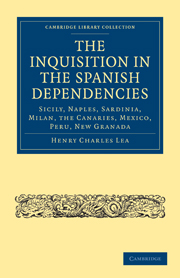 The Inquisition in the Spanish Dependencies
The Inquisition in the Spanish Dependencies Summary
When, on January 9, 1570, Servan de Cerezuela arrived at Lima to open a tribunal of the Inquisition, the condition of Spanish South America was such as to call for energetic action if the colony was to respond to the hopes of those who had so earnestly urged the Christianization of the New World. The establishment there of the Holy Office had been asked for by many who viewed with dismay the prevailing demoralization, and we shall see whether its influence proved to be for good or for evil. Peru had been conquered by adventurers inflamed with the thirst of gold, who in the eager search for wealth had thrown off the restraints of civilized life. The Church exercised little or no moral power for, as the existing Viceroy, Francisco de Toledo, reported, he found on his arrival that the clerics and frailes, bishops and prelates, were lords of the spiritual and acknowledged no superior in the temporal. The king was exposed to constant outlay in granting free passage by every fleet to great numbers of clerics and frailes who came under the pretext of converting and teaching the Indians, but, in reality, many devoted themselves to accumulating wealth, plucking the Indians in the endeavor to return to Spain with fortunes. These priests kept prisons, alguaziles and chains, seizing and punishing all who offended them and there was no one to call them to account.
- Type
- Chapter
- Information
- The Inquisition in the Spanish DependenciesSicily, Naples, Sardinia, Milan, the Canaries, Mexico, Peru, New Granada, pp. 319 - 452Publisher: Cambridge University PressPrint publication year: 2010First published in: 1908
